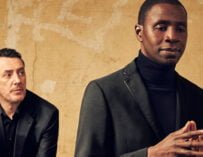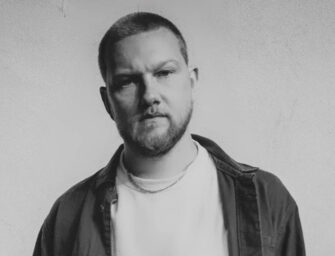
Paul Russell on Lil Boo Thang: “The thing that was the TikTok thing ended up being something that people wanted me to release.” Photo: Quinn Matthews
Discover how a viral TikTok rap over a 70s soul classic turned into a platinum hit and captivated listeners worldwide
Having grown up in Atlanta and then North Texas, Paul Russell is an LA-based musician who has capitalised on his captivating online presence in order to take his distinctive blend of hip-hop, pop and R&B to the next level. That ability to blend artistry and engagement is best exemplified by his break-out hit, Lil Boo Thang. Built over an immediately recognisable sample of The Emotions’ Best Of My Love, what started as a TikTok sensation soon snowballed and became one of the viral hits of 2023, leading to appearances on The Graham Norton Show, Good Morning America, and Jimmy Kimmel.
With circa 500 million streams and platinum status, Lil Boo Thang the kind of earworm that you’re happy to have playing on repeat in your mind for days at a time, and here, Russell tells us all about its journey from TikTok onwards…
Read more How I Wrote features

Released: 18 August 2023
Song: Lil Boo Thang
Artist: Paul Russell
Label: Arista
Songwriters: Paul Russell, Maurice White, Al McKay
Producer: Sean Cook
UK Chart Position: 20
US Chart Position: 14
“I had been making music for a while, and then a friend of mine was like, ‘Oh, you should get a TikTok.’ When I first started making TikToks, I saw there was a thing where people would find a rap song they liked and add their own rap verse on the end of it. I started doing that and I think I got a good chunk of my early audience from doing that, posting videos of me rapping on a hip-hop song. I’d also been releasing my own music for a while.
“I decided that I liked the idea of doing something similar to what I’d done back then, taking a song and making it my own – adding something to it. At the time I had listened to a lot of seventies soul and funk stuff and so I felt like, ‘What would it sound like if I made something where it was me rapping on an old song?’ But that song itself could be something that is more familiar, less of a hip-hop thing.
“So a lot of the thinking of it came from that. I also remember listening to a lot of DJ remixes where people would take a Drake verse or something and then put that over the instrumental for some old songs. So those things were all in my head.
“I still was working a job; I wasn’t a full-time musician or anything. It was a day when I was just hanging out and thought I wanted to make something. I was listening to music and heard Best Of My Love, a song I’ve loved for a while. I went online and found an instrumental of it. At the time, it wasn’t that I was thinking, ‘Oh, let me make a song.’ It was just like, ‘This would be a cool, fun, piece of content.’
“I got a mic and recorded myself freestyling over this thing. I found a clip of it that I liked, which was that 30-second clip that ended up being the hook of the song. I chopped that up and I put it on social media and it started growing and people started to enjoy it. So it felt like, ‘I guess I should finish this and turn it into a real song.’
“But, at the time, I didn’t know if we’d be able to get it cleared, because it’s from an existing song by The Emotions which was produced and written by some of the Earth Wind & Fire guys [Maurice White and Al McKay]. I made the full song not knowing if it would ever come out.
“All of the writing for the rest of the song happened in my bedroom. It was funny, the instrumental that I found online, someone had used some sort of AI program to take out the vocals of the original song and you could kind of hear little areas where it sounded weird and muffled. I had this super weird, muffled version of the song and created my own thing over the top of it.
“It was all about making something that was fun, making something for hanging out with your friends. At the time I was working a lot and going through a bunch of things. I had a friend pass away and I was stressed. I wanted to make something that took me out of that headspace and I imagined that I was at a wedding, just hanging out.
“I instinctively did it [sang part of Best Of My Love in Lil Boo Thang]. When I wrote it, obviously the chorus came first, that was the thing people had heard. Then, when I sat down to make the rest of the song, I wrote the first verse. This all happened pretty quickly. Because I wasn’t sure that the song was going to come out, I was like, ‘I can’t spend super long on this.’
“I wrote the first verse in an hour or so. It was getting late at night and, by the time I got to the second, I was like, ‘You know what, I’m not even gonna write a second verse.’ Like, ‘This is about being fun, what’s a fun thing to do here?’ So I turned it on and I ended up starting to sing that part of it. And I was like, ‘Hey, that feels good.’
“Afterwards, I kept thinking I should take that out and write a second verse. I would play the song for people and there were some who said that it was kind of a cop-out to sing the original at the end. There were other people who said it was their favourite thing. So I decided to keep it in. For one, I like the idea of having something that references the original more explicitly.

Paul Russell on writing Lil Boo Thang: “It can start as an algorithmic thing and then it can turn into something that’s real and authentic.” Photo: Quinn Matthews
“Now, whenever I perform Lil Boo Thang, most of the people in the audience know my version of the song, and so they can sing it. But, when I first started performing it, it was so amazing to have that part with the Best Of My Love thing at the end, because there was finally something that the audience knew. I could start singing that and everyone would start singing along. It was like, ‘This is my song but this part of it is not mine and you know it.’ I could connect with the audience at that moment. That was always really beautiful.
“Sometimes leaving stuff where it is in its most raw form, is the best. I find that, for a lot of songs, when I go back later and try to make a bunch of changes, the changes don’t feel as authentic and as real as whatever I did the first day, because the first day I was feeling whatever I was trying to communicate and whatever kind of vibe I was in.
“I wrote the song over that little beat and then, once we found out that we could get it cleared, I sent it to a producer named Sean Cook that I’d worked with on a few things. He went and replayed a lot of the instruments and got it to the point where it wasn’t this muffled thing. We added so many elements to it, to make it build as a song and to make so many different things work and fit together and give it its own structure. It wasn’t just that I took the original instrumental and did stuff over it.
“One of the hardest things was that back in the seventies, when the original song was made, it was a much more common thing for all the different musicians to go into the studio and just play something together. As a result of that, a lot of times they wouldn’t use a metronome. So the original instrumental has a range of BPM, it slows down and it speeds up.
“It was really interesting trying to piece all that together. When I wrote my verse over the top of the song, it was to the instrumental which at one point was three BPMs higher than another point. To then go and play the instruments underneath that was difficult because I had to try to keep up with this random thing. That was a whole process.
“Then there were so many times of us going back and forth on the phone, like, ‘Okay, I listened to it again and I felt like in this part the guitar was a little slower. So could you slow that down?’ Or, ‘Can you scoot my vocal?’ It was a long process of getting everything to fit together. Even now, Lil Boo Thang itself, also has that range of BPM, because of what it was based off of.
“I remember when the song was about to come out, because I noticed all of the random tempo changes in it, I was terrified that people would listen to the song. and be like, ‘What is going on?’ But you know, I’ve never heard anyone say anything about the tempo.
“A lot of it was about the feeling of the song, the moment where I could close my eyes and this song could fully transport me somewhere. Then it’s like, ‘Okay, I feel like we’ve done enough.’ There have been times when I want to keep working on a song and keep fiddling with it. Honestly, this was one of those songs, where I was very tempted to be like, ‘No, wait a little longer. Let’s figure this out. Let’s figure that out.’ Partially because of the tempo thing and because there was so much pressure on the song.

Paul Russell on Lil Boo Thang: “It was all about making something that was fun, making something for hanging out with your friends.” Photo: Quinn Matthews
“Before I released it, the little audio of it was the third highest trending song on Instagram at the time. So if we released it and it sucked, it would have been such a missed opportunity. So there was a lot of going back and forth, ‘Okay, let me change this little thing.’ Little lines where it was, ‘Oh, I don’t want to say this. I want to change it to say this.’
“I remember, I was on a plane, and I turned the song on in my headphones. And I was like, ‘There’s a bunch of things I still want to edit about the song. But actually, when I listen to it, it makes me feel good.’ That’s the most important thing. What a song should be, first and foremost, is a vehicle to communicate some sort of emotion to people. If you accomplish that goal, then the rest of the stuff is just details.
“So I decided, ‘Alright, we’re gonna stick with this, and we’re gonna see how it goes.’ I’m glad I did. There are little things we could have edited here and there, but I think no one would have noticed anyway.
“When I first started out doing the social media stuff, there was definitely a period where I was feeling like TikTok has ruined music and we’re making things for an algorithm. I think that it’s true that that happens a lot, and I think that is a sad thing.
“The way that I was thinking was, ‘I hate it when people make songs for TikTok that they’re gonna release.’ So I was like, ‘I’m gonna make songs for me that I’m gonna release and then I’m gonna make these little TikTok things that are just fun.’ Then the thing that was the TikTok thing ended up being something that people wanted me to release.
“I guess the best way to do it is just making whatever I feel passionate about and then you can figure out how it fits into the world and the ecosystem right now. It doesn’t have to be that people are either making music for an algorithm and it sucks, or they’re making the super artistic stuff. It can start as an algorithmic thing and then it can turn into something that’s real and authentic. It also gives you a way to get instant feedback on stuff.
“I still enjoy it. I think it’s a fun song. I remember, by the time I first released it, because it was like a few month’s process of trying to get everything cleared and all of that, I was sick of the song and I was like, ‘I don’t care.’ But then, maybe because I hear it so much and perform it all the time, I now have so many good memories associated with the song. It is just fun for me. I don’t mind talking about it or thinking about it. It’s a part of my life, this song that I hear every day.”
Lil Boo Thang songwriter Paul Russell is currently supporting Teddy Swims on tour – for all the latest info, check out linktr.ee/paulrussell
Read more How I Wrote features


































Related Articles